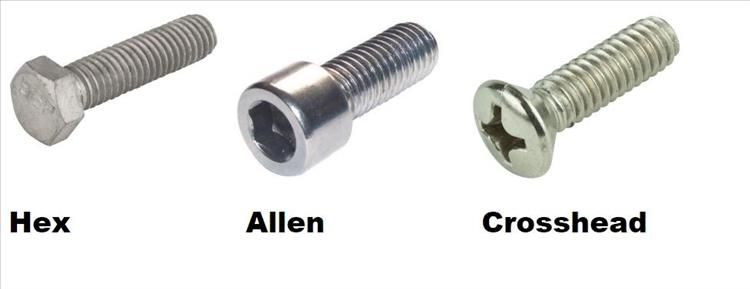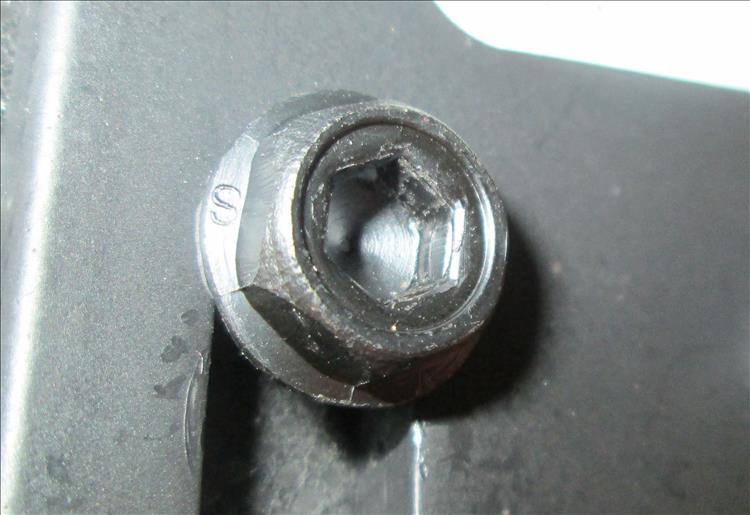Home
Ren's Biking Blog
A Better Bolt
Blog Date - Thursday, February 13, 2020
Remember -
Hex = traditional standard six sided bolts.
Crosshead = JIS or Phillips or crosshead or cruciform type bolts (more often screws).
Allen = Cap headed or recessed hex or Allen type bolts.

Traditional Hex headed bolts are, in my opinion, the best out there although not perfect. Crosshead type screws and bolts have a habit of getting chewed up and to be honest Allen bolts aren't far behind.
The hex headed bolt (or nut) has the most surface area for a tool to grip onto, to apply the force to. On the good side this means the tool doing the undoing has the best chance of gripping the head and applying sufficient torque to turn it. Of course one obvious downside is the tool doing the tightening has sufficient torque to tighten the bolt really really blasted tight to the point of shearing the bolt or stripping out the threads.
Can you imagine stripping threads with a Crosshead screwdriver even on small M6 bolt? Generally speaking a Crosshead screwdriver can't impart enough torque to even call that bolt "barely tight enough". That didn't stop Honda et al using Crosshead bolts in their engine casings back in the 80s. I suspect they had special machines to tighten the hell out of the bolt, ensuring would be home spanner monkeys can't ever get inside.
So, right, OK, yeah, right hmmmm. We need enough meat to tighten the bolt enough to be tight, but not so much meat that it's too tight? And then when we undo it we need more meat in case it's become tight? Ideally we need an allen headed bolt when putting things together, tight but not too tight. Then a hex bolt when we're taking things apart, good turning force in case things have seized.
Why is the world so cruel?!?
When assembling an office chair I came across the perfect solution. The - drum roll please - cap and hex head bolt! TA-DA!!

So as you can see it has a allen head. This allows the bolt to be tightened using standard Allen keys and for the most part these could be used to undo them. But what if the allen socket gets damaged as is often the case? Use a standard spanner on the hex and away you go.
Alas and alack the world is not a perfect place. This bolt seems to be the obvious choice but there will be an additional cost to manufacturing them. While tuppence per bolt may seem very little to myself, to Honda / Kawasaki et al who'll go through a million a year, that'll be enough to put them off.
In the meantime I shall dream of a perfect world where all bolts are tight but always come loose with a firm heave on the wrench.
Click here if you'd like to add your own article to Bikes And Travels.
Reader's Comments
Ian Soady said :-
You might expect me to come along and comment....
If it's used on an office chair it's unlikely to be strong enough for many bike applications, especially safety critical ones. These normally need high tensile fixings (denoted by a pair of numbers - 8.8 is normally the lowest I would go). 8.8 is nearly 3 times as strong as cheap carbon steel which is what yours likely are.
You missed of torx heads which are like posh Allen screws and are used extensively these days as they're better for robots to use. They also allow more torque to be applied. You can also get external spline drive which are like inside out torx.
I will refrain form pointing out (well OK then if you insist) that you've left out Pozidriv although to be fair these are rarely found on bikes. But if you go and buy a cross head screwdriver in your local B&Q it will likely be Pozidriv and these don't work well at all on Phillips or JIS screw heads. If you strip ordinary Allen screws with a well fitting key then you're doing something wrong.....
https://www.westfieldfasteners.co.uk/Ref_Strength_Spec.html...
20/02/2020 14:01:38 UTC
John Watson said :-
In no way a critism, but for info, the illustrations show set screws, bolts are only threaded part way along the shank. Quite important when considering specific applications.
20/02/2020 14:34:15 UTC
Ren - The Ed¹ said :-
Aaaah John Watson - I have heard such thing before! You can correct me if I am wrong but the true definition of a screw is that the thread(s) go all the way to the head whereas a bolt has an unthreaded area before the head? It's just when I wur a lad we had bolts like as shown holding our bicycles together and screws where what you used to hold bits of wood together. I accept your correction but maintain that - you know what I mean.
I knew this would stir you to action Ian. I quite agree the actual bolt pictured is too feeble and shallow for the rigours of motorcycling especially under the duress of my clumsy paws. As a point in case though imagine a sturdier bolt (screw?) with both hex and allen, or to go belt and braces why not torx and external splined (external torx?)
20/02/2020 16:26:40 UTC
Snod said :-
You can put plenty of torque into a crosshead screw if you use a wrench with a bit in an adapter. This also allows you to keep pressing into the screw while you turn it, I actually quite like JIS screws now. You have to find the right bit though, it should fit "just so" otherwise you're on the fast train to chewdom, choo choo!
20/02/2020 22:48:05 UTC
Ian Soady said :-
I agree about JIS and I only learnt about them a couple of years ago after 50 years or so of chewing them up with the wrong drivers! The correct ones fit perfectly and don't rock about like the wrong ones.
John: yes, you're right but I didn't want to overburden Ren who as we know likes things simple... We have had several discussions here over the years about bolts etc - far more interesting than oil or tyre threads.
21/02/2020 10:54:14 UTC
Upt'North said :-
What about the Chinese. Not in general or horrible germs but the screws. I wonder if they're JIS. I suppose the safe option is to use a JIS driver as I believe these can be used on Phillips without issues.
Upt'North.
21/02/2020 12:56:16 UTC
Ian Soady said :-
Correct Upt' but not the other way round. I found the fit of proper JIS drivers a revelation - although there are few makers (Vessel is the only one I know of) and they're not cheap.
22/02/2020 09:58:54 UTC
Upt'North said :-
Ian, when you're right, you're right.
It's quite strange too that although these screws have been around in the UK from the 60'ies the bits are not more common place. I'm sure if you bought a set of Draper/Bosch/SnapOn bits there wouldn't be a JIS in sight. I'm guessing if you bought a set in Japan it would be all JIS.
From tackling JIS and Phillips for years I think the JIS is a superior screw but obviously only with the correct driver.
Upt'North.
Now what about 1 BA, 2 BA and 3 BA.
22/02/2020 12:23:13 UTC
Ian Soady said :-
I'm always right, you know that. I was wrong once but I think I got away with it......
I agree JIS is better although have to admit that Pozidriv with new screw and driver runs it close.
And what's wrong with BA pray (although 3BA is very uncommon). They are a peculiar thread which I think were originally based on watchmakers' series. The pitch varies as a function of the diameter. And as you know, the bigger numbers are the smaller sizes. I have a set of BA taps and the smallest sizes are like needles. I couldn't imagine actually using them.
Some of my favourite bedtime reading is a Machinery thread manual which includes all sorts of esoteric threads.
22/02/2020 12:35:25 UTC
Ren - The Ed¹ said :-
It's like the annual meeting of the JIS appreciation society in here! In spite of all the love I still believe a hex is the best option. I'd like to see hex woodscrews (I know they exist but they aren't commonplace).
What he deuce is BA? If we're going esoteric how about 3 sided heads? I am aware of a 4 sided Allen style woodscrews. Along with 6 sided torx there's 12 sided. It's all mind boggling, when I am emperor of the world there will only be 2 choices, simples.
23/02/2020 07:28:36 UTC
Upt'North said :-
British Association screw threads, or BA screw threads, are a largely obsolete set of small screw threads, the largest being 0BA at 6 mm diameter. They were, and to some extent still are, used for miniature instruments and modelling.
They are unusual in that they were probably the most "scientific" design of screw, starting with 0BA at 6.0 mm diameter and 1.0 mm pitch and progressing in a geometric sequence where each larger number was 0.9 times the pitch of the last size. They then rounded to 2 significant figures in metric and then converting to inches and rounding to the thousandth of an inch. This anticipated worldwide metrication by about a century. The design was first proposed by the British Association in 1884[1][2] with a thread angle and depth based on the Swiss Thury thread,[3] it was adopted by the Association in 1903.
All you ever need to know about BA. Now you can forget it Ren, it'll make your Ed hurt.
I used these at ERF, can't remember what on or for.
Upt'North.
23/02/2020 10:11:27 UTC
Ren - The Ed¹ said :-
British Association, muddying the waters between metric and imperial for over 100 years? It makes me proud to be British. I weigh 12 and a half stone but my bikes weighs 197kg. I am 5 feet 8 inches short but my bike's seat height is 810mm. The speed limit is 30 miles per hour in town but acceleration due to gravity is 9.8 metres per second squared.
Does this mean I am multilingual?
24/02/2020 09:21:53 UTC
Name
Comment
Add a RELEVANT link (not required)
Upload an image (not required) -
Uploading...
Home
Ren's Biking Blog